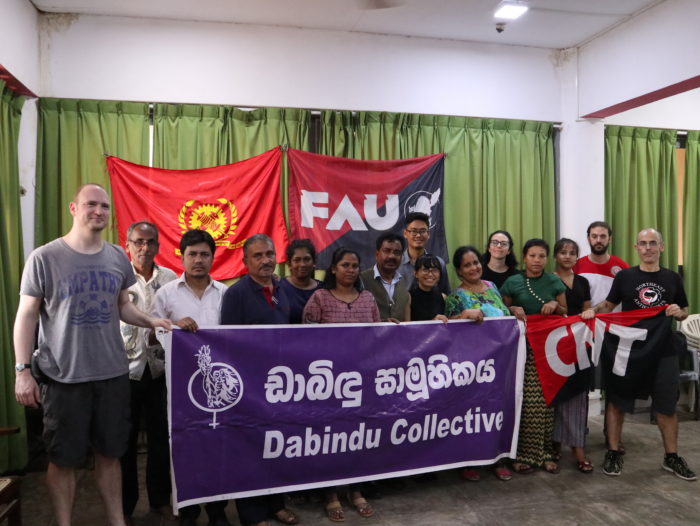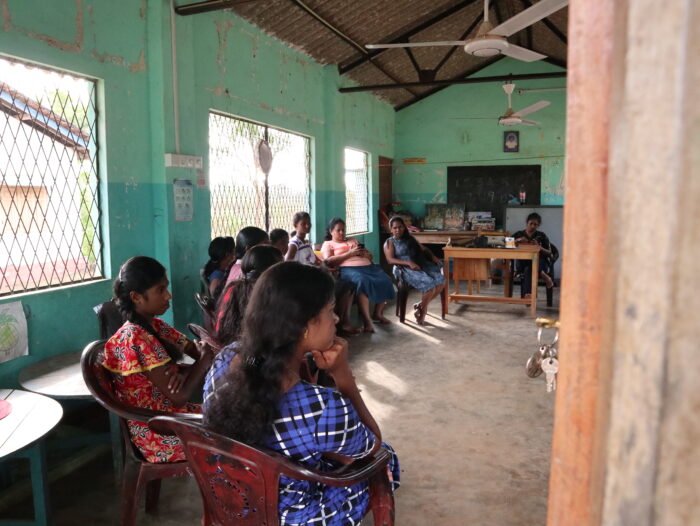No spots on the Lidl shirt
In Sri Lanka and Myanmar, grassroot unions and a feminist collective are trying to organise garment workers in textile factories
Von Helene Buchholz

Devika Nandani* is 28 years old, single mother of two children and lives in the north of Sri Lanka. She says she sews for H&M and Lidl, but most of her colleagues* don’t really know which brands and companies they sew for because the orders are often placed through middlemen. And some of the fashion brands‘ logos are only sewn in by a few workers at the end of the production chain.
I meet Devika in a tiny school building with ten other garment workers. Some are only 17 years old. Many families depend on the low wages of their daughters, sisters or wifes. 80 percent of the garment workers in the textile factories are women – for the sewers even more than 90 percent. Most of them are young women, because workers cannot do this job for a long time.
The school building where we meet was donated by the »Norwegian people«, says a sign at the entrance. It consists of four bare walls and a roof. There are no windows, only holes with bars in front. The floor is dusty.

This is where I meet 31-year-old village teacher Malar Bhumika*. Next to her main job, she is also district manager for the Dabindu Collective. The Collective is a feminist organisation that tries to fight for better working conditions for garment workers in Sri Lanka. To achieve this, the members of the collective rely on the help of the residents. Malar has agreed to wait for the local women at the bus stop and invited them to a meeting with the Dabindu Collective at the school. She wants to help to improve the situation of her neighbours. At this meeting, I am allowed in as a guest and have the opportunity talk to the workers.
Everyday life of a garment worker
Devika Nandani works six days a week, many of her colleagues even seven. They have neither holidays nor vacations. Their earnings are barely enough to cover the most basic necessities. Devika lives in a village in the northern province of Sri Lanka. It is a poor region. There are no roads in the village, the paths are dusty and bumpy. Underfed cows and chickens stroll around between stray dogs and playing children.
This northern part of Sri Lanka is the homeland of the Tamils, a minority against which the central government has fought a war for about 30 years.
Although there has been peace for ten years now,the police and military are still present in everyday life. For example at numerous roadblocks officially intended to control the drug trade. The sewing factories of the various textile manufacturers such as Victoria’s Secret, Lild or H&M were established only recently in this region.
Drinking is forbidden during work. The clothes need to be spotless.
Devika’s day starts at four a.m. Since her husband left her, she is solely responsible for the children and the household. She cooks before waking the children and taking them to her mother’s at around six a.m.. Then she takes the shuttle bus to the factory where she works. The journey takes one hour, her shift lasts nine. During distribution season, her overtime is open ended. Sometimes the work doesn‘t end before midnight. Almost all garment workers depend on such overtime, because the regular wage is not enough to live on. Devika’s whole family needs her salary. Her father is ill and needs financial help. Devika herself is afraid of getting kidney problems because drinking is forbidden during work. The clothes need to be spotless.
When Devika comes home, she cooks, does laundry and takes care of the household. In the evening the children come home from her mother’s. They only spend time together during dinner, afterwards the children go to bed. When the household is finished, Devika can also sleep for a few hours – until the alarm clock rings again at four a.m. and everything starts all over. Six days a week, no holidays, no vacation.
Strategies of the textile industry
Sri Lanka has many factories like the one Devika Nandani works at. Especially in areas where the people are particularly poor. There is a system to this: For fear of losing their much needed job, many workers in the poorer parts of the country do not dare to rebel against the bad working conditions. And only few even know about their rights.
Some factories are also settling in the highlands in the center of the island, outside of the Tamil areas in the north. Although transport routes are in poor condition, there are advantages for the textile companies. For critical organisations like the Dabindu Collective, these factories are difficult to reach due to their limited budget. The compliance with labour standards can hardly be monitored effectively here. There have been instances in which the workers in these factories were locked in for 24 hours in order to produce continuously, says Chamila Thushari from the Dabindu Collective. Some garment workers have fallen off their chairs because they fell asleep. At some point the police reopened the gates.
Many of these factories have well-sounding names, such as Triple Safety. The company describes itself as a »highly ethical and socially responsible textile manufacturer and supplier«. However, the reality is oftentimes completely contrary to that smooth facade: Standing around for hours in the heat without drinking and the lack of protection clothing constitute a health hazard for the workers.Often sexualised violence against women workers also occurs. Since the women have to produce a certain number of pieces within certain periods of time, sometimes even every hour, before they are allowed to leave, they are dependent on their sewing machines being quickly repaired if they break down. This puts them in dependence to the male mechanics, who often take advantage of the situation and sexually harass the women.
The inhumane working conditions of the garment workers often violate Sri Lankan applicable law,but most of the time the people affected do not even know who to hold accountable. The network of manufacturers, suppliers, middlemen and clients is intransparentand research is costly. Nevertheless, the Dabindu Collective has been trying to position itself in this field and to support the garment workers in recent years. The NGO has been recognized as a trade union only since early 2020. The five unionists try to organize the women and encourage them to fight together for better working conditions. Currently, they are concentrating on exhausting the legal possibilities. However, it is difficult to win the women over for direct action, says Chamila Thushari. They are under high pressure and have too little time. And perhaps too few examples of best practise.
Role model Myanmar
In Myanmar, on the other hand, it is relatively easy to win women from sewing factories over for strikes, says Ya Tha* from the Solidarity Center on the side lines of a trade union conference in Colombo at the end of February. The Solidarity Center is part of a US and Canadian trade union confederation. It supports the development of grassroots trade unions locally. So far, there is no large, overarching trade union in Myanmar. Nevertheless, for some time now, an increasing number of garment workers have been organising and building up trade union structures in individual sewing factories. These factory-related trade unions have joined together in the Federation of Garment Workers Myanmar (FGWM). Many already have good experiences with strikes here. Moe Sandar Myint (FGWM) reports that they once fought for the dismissal of a mechanic who sexually harassed a woman. The workers striked for a week, after which the mechanic was gone. The factory then had a new union and managed to formulate and push through further demands.
The trade union movement in Myanmar is relatively young, because until 2010, the country was ruled by a military dictatorship. Only since then have trade union structures been able to establish themselves here at all. Grassroots trade unions in particular appear to be successful with their approach. Now it is important not only to spread their experience within Myanmar, but also to ensure solidarity and stable international networking. For there is always the danger that factory owners will simply close down their branch if the workforce demands too much from them and relocate production to Bangladesh, for example, where poverty and the dependency of the people on their work are often even greater.
Cross-border networking
The need for cross-border networking of textile workers was also the reason for the international conference at the end of February in Colombo, capital of Sri Lanka. The Dabindu Collective and the German radical left-wing grassroots union Freie Arbeiter*innen Union (FAU) were the main organisers. For two days, around 30 participants from five different countries exchanged views on how international networking can look like and how Western trade unions can also make a meaningful contribution. In addition to FAU, the Confederación Nacional del Trabajo (CNT) from Spain and its international umbrella organisation, the International Confederation of Labour (ICL), also took part.

All participants agreed that the pressure must primarily come from the workers themselves. But – as both Sri Lankan and Myanmar trade unions describe it: Western fashion brands, which are concerned about their clean image, are also sensitive to public protest against the working conditions under which their products are manufactured. Even small, symbolic actions in front of H&M or Victoria’s Secret stores can make a difference. Therefore, strikes in local sewing factories should ideally be simultaneously supported by solidarity actions in other countries. This increases the chances of success for the garment workers. For this purpose, the conference participants established short communication channels , exchanged banners for photo campaignsand refined concepts for further cooperation. The first joint action is already scheduled for May 1: Participants from Bangladesh, Sri Lanka, Myanmar and Germany, among others, want to unite under the Motto »One World One Struggle« and take the streets with the same banner and thus declare their solidarity with each other.
The long-term goal is for employees of H&M, Lidl and others in Europe to show solidarity with producers in their labour disputes in Asia and South America and vice versa, for consumers to increase the pressure on brands, and for workers in garment factories to no longer be willing to produce clothes under current conditions. A start has been made.
Helene Buchholz
Helene Buchholz actually works in radio, in her free time she likes to travel and is politically active. Now and then she writes texts for small left-wing radical newspapers.
Note: * Name changed by the editorial staff.